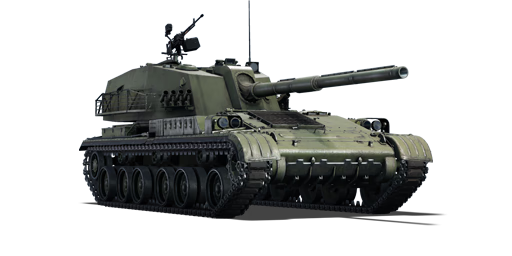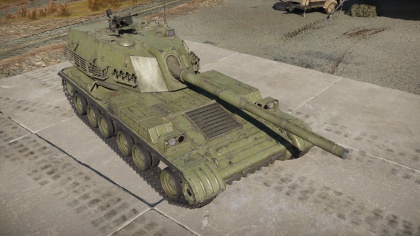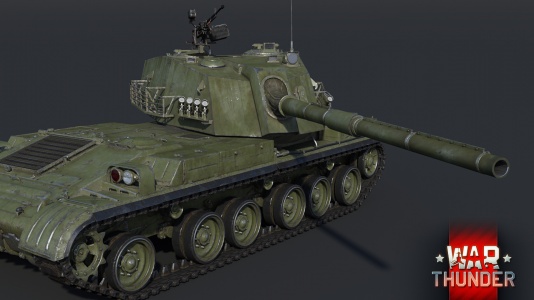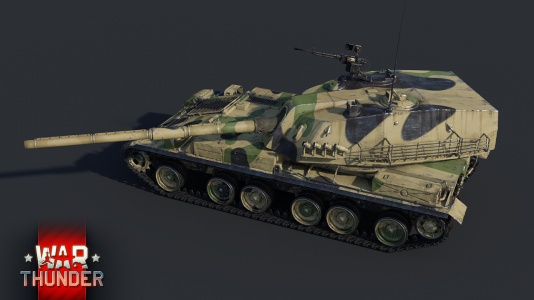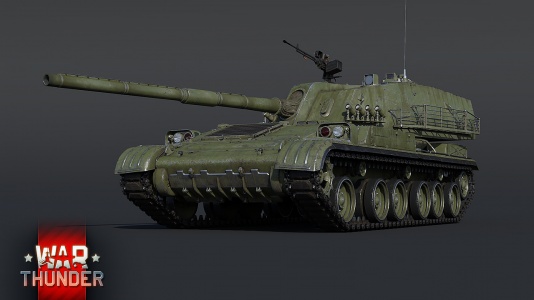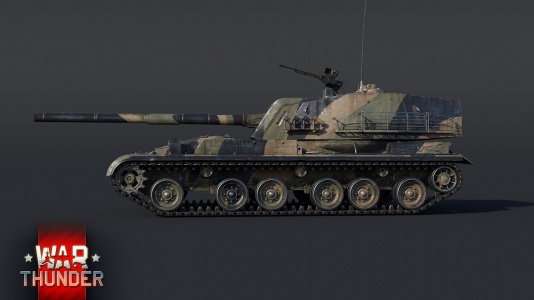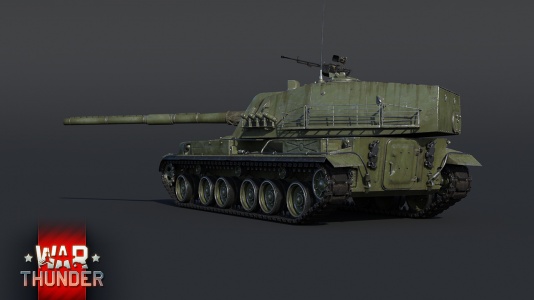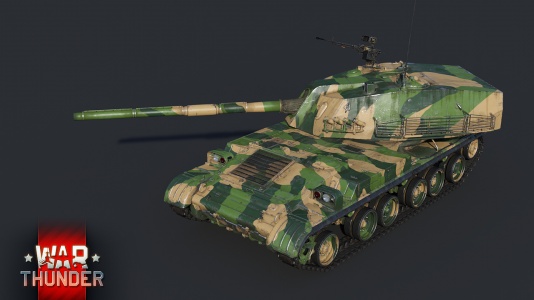PTZ89
Contents
Description
The HuoPao Tanke ZiXing 89 is a rank VI Chinese tank destroyer
with a battle rating of 9.0 (AB/RB/SB). It was introduced in Update "New Power".
The PTZ89 is a purpose-built tank destroyer armed with a formidable 120 mm smoothbore gun, somewhat similar in layout and concept to the infamous Soviet Object 120. It is remarkable for having entered service in 1989; by then, the era of the main battle tank was well underway and gun-armed tank destroyers were out of fashion. This conundrum exists in War Thunder as well, where the PTZ89 faces agile and well-armed tanks like the Leopard A1A1 while not being speedy or well-protected itself. Still, if the PTZ89 does one thing well, it's firepower. The marvelous cannon easily penetrates almost anything it meets and the assisted loader allows several targets to be destroyed in quick succession. This vehicle is all about its gun and a skilled gunner can make good use of it for sniping and ambushes.
General info
Survivability and armour
The PTZ89 is built on the chassis of the Type 83 self-propelled howitzer and its overall protection is disappointing. The hull has enough armour to shrug off heavy machine guns from the front but the sides are only 15 mm thick. The large and bulbous turret is even more vulnerable, the sloped turret face only being 22 mm thick. Never trust the armour of the PTZ89, vehicles armed with autocannons will easily shred it and it can be gunned down by the ubiquitous M2 Browning from the sides. Any aircraft equipped with cannons or heavy machine guns can destroy it from above.
The thin armour ironically makes subcaliber rounds produce less spalling upon penetrating the tank, but the internal layout can still lead to fatal results. The three crew members are lined up on the left side of the tank (right side from an attacker's perspective) and well-aimed shots might knock all of them out, putting the vehicle out of commission. That said, the turret seating is rather high and there is a chance that a shot knocking out the driver might pass underneath the turret crew. The turret bustle also houses many rounds of ammunition without blowout racks and penetrating shots to the turret front or rear can set them off.
The PTZ89 is vulnerable to hull break from chemical rounds like HEAT-FS but not kinetic rounds like APFSDS. Be extra careful to avoid artillery, ATGMs, bombs, and rockets when possible.
| Armour | Front (Slope angle) | Sides | Rear | Roof |
|---|---|---|---|---|
| Hull | 10 + 10 mm (71°) Upper glacis 35 mm (1-66°) Transmission housing 15 mm (20°) Mine plow attachment plate |
15 mm | 10 (9°) mm | 10 mm |
| Turret | 22 mm (30°) Turret front 30 mm (32°) Gun mask 40 mm (9-36°) Gun mantlet |
18 mm (14°) | 18 mm | 15 mm (79-89°) |
| Cupola | 15 mm | 15 mm | 15 mm | 15 mm |
Notes:
- Suspension wheels are 20 mm of structural steel, tracks are 15 mm thick,
- Engine radiator grilles are 5 mm of RHA.
- Internal firewall around the engine/transmission compartment, 5 mm RHA thick.
- Slat armour on turret sides, 10 mm of structural steel.
- Skirts and storage boxes above tracks are 4 mm of structural steel.
Mobility
| Game Mode | Max Speed (km/h) | Weight (tons) | Engine power (horsepower) | Power-to-weight ratio (hp/ton) | |||
|---|---|---|---|---|---|---|---|
| Forward | Reverse | Stock | Upgraded | Stock | Upgraded | ||
| Arcade | 60 | 9 | 30 | 739 | 992 | 24.63 | 33.07 |
| Realistic | 56 | 8 | 460 | 520 | 15.33 | 17.33 | |
Armaments
Main armament
Give the reader information about the characteristics of the main gun. Assess its effectiveness in a battle based on the reloading speed, ballistics and the power of shells. Do not forget about the flexibility of the fire, that is how quickly the cannon can be aimed at the target, open fire on it and aim at another enemy. Add a link to the main article on the gun: {{main|Name of the weapon}}. Describe in general terms the ammunition available for the main gun. Give advice on how to use them and how to fill the ammunition storage.
| 120 mm PTZ89 | Turret rotation speed (°/s) | Reloading rate (seconds) | |||||||||||
|---|---|---|---|---|---|---|---|---|---|---|---|---|---|
| Mode | Capacity | Vertical | Horizontal | Stabilizer | Stock | Upgraded | Full | Expert | Aced | Stock | Full | Expert | Aced |
| Arcade | 30 | -5°/+18° | ±180° | Two-plane | 13.2 | __._ | __._ | __._ | __._ | 5.00 | 5.00 | 5.00 | 5.00 |
| Realistic | 8.9 | __._ | __._ | __._ | __._ | ||||||||
Ammunition
| Penetration statistics | |||||||
|---|---|---|---|---|---|---|---|
| Ammunition | Type of warhead |
Penetration @ 0° Angle of Attack (mm) | |||||
| 10 m | 100 m | 500 m | 1,000 m | 1,500 m | 2,000 m | ||
| DYW1 | APFSDS | 443 | 442 | 436 | 429 | 422 | 416 |
| DYS120 | HE | 30 | 30 | 30 | 30 | 30 | 30 |
| Shell details | |||||||||
|---|---|---|---|---|---|---|---|---|---|
| Ammunition | Type of warhead |
Velocity (m/s) |
Projectile Mass (kg) |
Fuse delay (m) |
Fuse sensitivity (mm) |
Explosive Mass (TNT equivalent) (g) |
Ricochet | ||
| 0% | 50% | 100% | |||||||
| DYW1 | APFSDS | 1,740 | 4.45 | N/A | N/A | N/A | 78° | 80° | 81° |
| DYS120 | HE | 900 | 19.5 | 0 | 0.1 | 2,490 | 79° | 80° | 81° |
Ammo racks
| Full ammo |
1st rack empty |
2nd rack empty |
3rd rack empty |
4th rack empty |
5th rack empty |
6th rack empty |
Visual discrepancy |
|---|---|---|---|---|---|---|---|
| 30 | __ (+__) | __ (+__) | __ (+__) | __ (+__) | __ (+__) | __ (+__) | __ |
Machine guns
| 12.7 mm QJC88A | ||||
|---|---|---|---|---|
| Mount | Capacity (Belt) | Fire rate | Vertical | Horizontal |
| Pintle | 500 (150) | 700 | -5°/+60° | ±180° |
Usage in battles
Describe the tactics of playing in the vehicle, the features of using vehicles in the team and advice on tactics. Refrain from creating a "guide" - do not impose a single point of view but instead give the reader food for thought. Describe the most dangerous enemies and give recommendations on fighting them. If necessary, note the specifics of the game in different modes (AB, RB, SB).
Modules
| Tier | Mobility | Protection | Firepower | ||
|---|---|---|---|---|---|
| I | Tracks | Parts | Horizontal Drive | ||
| II | Suspension | Brake System | FPE | Adjustment of Fire | |
| III | Filters | Crew Replenishment | Elevation Mechanism | ||
| IV | Transmission | Engine | Smoke grenade | Laser rangefinder | NVD |
Pros and cons
Pros:
- Excellent APFSDS round with very high velocity, great penetration and flat trajectory; comes with the vehicle as stock ammo
- Five-second reload thanks to the assisted loader
- Two-plane stabilizer giving it advantage in shoot-n-scoot tactic or sudden close encounters
- Roof-mounted 12.7 mm heavy machine gun can effectively damage low flying helicopters, lightly armoured vehicles or even aircraft
- Two salvos of smoke grenades can provide protective cover (to some extent) twice for the player
- Nice top speed
Cons:
- Very poor all-round armour making it extremely vulnerable to rockets, bombs or even .50 calibre rounds, let alone APFSDS and missiles
- Mediocre mobility
- Slow reverse speed of only 7-8 kph can put the player in a fatal situation
- Below average turret rotation speed
- Bad gun depression of only -5 degrees, limiting its terrain adaptation for different maps
- Humongous tank, increasing the chance of being spotted and hit
- Can be hull broken by chemical munitions
History
During the 1970s, new tanks like the T-64 and T-72 were entering service in the Soviet Union, and with tensions between China and the Soviet Union still being tense, China needed a gun capable of defeating these tanks. The problem was, their primary tank was still the Type 59, a Chinese version of the T-54 tank, still armed with a 100 mm rifled gun. During this period, China tried to turn to Rheinmetall for their new 120 mm L/44 smoothbore gun, but this was rejected. The Chinese decided to develop their own gun, using technology and knowledge from the T-62 they had captured at Zhenbao Island.
In 1979, three versions of the gun were completed, with an estimated 1,000 APFSDS rounds fired. In February of that year, gun design 82-2 penetrated 204 mm on a 68 degree armour at a speed of 1,646 m/s. In 1981, the basic design was completed, with gun design 82-14 being chosen for the new 120 mm smoothbore gun. This could fire an APFSDS projectile at 1,700 m/s, penetrating 204 mm of armor at a 68 degree angle.
Following this, the gun was put in a turret on the Type 321 utility tracked chassis that would be used on other vehicles such as the PHZ-89 or PGZ-09. The vehicle would be demonstrated in 1985 in Nankou, Beijing, with more tests being conducted until late 1988, when it finally began initial production. It first entered service in 1989, and by the time it was retired, around 100 had been produced. Having served its purpose and with the rise of new Chinese MBTs such as the ZTZ99 (with more capable guns), it retired in November 2015, when the 39th Army Group held an official retirement ceremony for the vehicle.
Devblog
In the late 1970’s, Chinese engineers began developing a new combat vehicle which would be capable of defeating some of the most commonly used second generation main battle tanks, such as the Soviet T-62 and T-72, among others. The basic design would be that of a turreted, lightly armoured yet mobile tank destroyer.
Development work was slow and dragged itself through the first half of the 1980’s for various reasons, including lack of funding. However, by the late 1980’s, the project picked up pace again and several prototypes and pre-production vehicles were built for testing and evaluation.
Following a successful testing phase, the PTZ-89, as it became known, was approved for production in early 1990, with small-scale production commencing and the first vehicles reaching units in 1991. With the end of the Cold War, however, the need for a vehicle such as the PTZ-89 diminished, leading to an early production stop in the late 1990s.
Media
- Skins
- Videos
Images
- PTZ-89 Devblog Images
See also
Links to the articles on the War Thunder Wiki that you think will be useful for the reader, for example:
- reference to the series of the vehicles;
- links to approximate analogues of other nations and research trees.
External links
| China tank destroyers | |
|---|---|
| PLA | |
| Gun vehicles | PLZ83 · PLZ83-130 · PTZ89 |
| Missile vehicles | AFT09 |
| ROC | |
| Missile vehicles | CM25 |
| USA | |
| Gun vehicles | ␗M8 HMC · LVT(A)(4) (ZiS-2) · ␗M10 GMC · ␗M36 GMC |
| Missile vehicles | ␗M113A1 (TOW) |
| USSR | |
| Gun vehicles | ␗SU-76M · ␗ISU-152 · ␗ISU-122 · ␗SU-100 |


